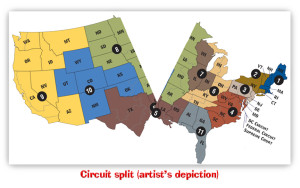We post news and comment on federal criminal justice issues, focused primarily on trial and post-conviction matters, legislative initiatives, and sentencing issues.

GOVERNMENT ENDS RANGE V. ATTY GENERAL NOT WITH A BANG BUT A WHIMPER
 Last December, the 3d Circuit held that the 18 USC 922(g)(1) felon-in-possession statute was unconstitutional as applied to Bryan Range. Bryan’s recent criminal history included nothing more than a few traffic tickets and fishing without a license, but a quarter century before, he was convicted of making a false statement to get food stamps for his hungry family. That was enough to trigger the F-I-P prohibition on his possessing a gun.
Last December, the 3d Circuit held that the 18 USC 922(g)(1) felon-in-possession statute was unconstitutional as applied to Bryan Range. Bryan’s recent criminal history included nothing more than a few traffic tickets and fishing without a license, but a quarter century before, he was convicted of making a false statement to get food stamps for his hungry family. That was enough to trigger the F-I-P prohibition on his possessing a gun.
The en banc opinion held in essence that a prior nonviolent offense that qualified under 18 USC 922(g)(1) to prohibit someone from possessing a gun violated the 2nd Amendment. Applying New York State Rifle & Pistol Association v. Bruen and United States v. Rahimi, the Circuit held that Bryan
remains one of ‘the people’ protected by the 2nd Amendment, and his eligibility to lawfully purchase a rifle and a shotgun is protected by his right to keep and bear arms. More than two decades after he was convicted of food-stamp fraud and completed his sentence, he sought protection from prosecution under § 922(g)(1) for any future possession of a firearm. The record contains no evidence that Range poses a physical danger to others. Because the Government has not shown that our Republic has a longstanding history and tradition of depriving people like Range of their firearms, 922(g)(1) cannot constitutionally strip him of his 2nd Amendment rights.
This was not the case’s first rodeo. An en banc opinion held the same for Bryan in June 2023, but the Biden Dept of Justice sought Supreme Court review. While the petition was pending, the Supreme Court handed down Rahimi, a case that held that temporarily disarming someone subject to a domestic protection order complied with the 2nd Amendment. SCOTUS remanded all pending 2nd Amendment challenges on its docket – including Range – for reconsideration in light of Rahimi.
 The 3d Circuit ruled that the end of 2024 that nothing in Rahimi changed its position on Bryan’s 2nd Amendment right to buy a hunting rifle. I was fairly sure that the government would head to the Supreme Court again in order to protect America from the dangerous likes of Bryan. Indeed, the DOJ sent signals that it was seriously considering doing just that.
The 3d Circuit ruled that the end of 2024 that nothing in Rahimi changed its position on Bryan’s 2nd Amendment right to buy a hunting rifle. I was fairly sure that the government would head to the Supreme Court again in order to protect America from the dangerous likes of Bryan. Indeed, the DOJ sent signals that it was seriously considering doing just that.
In mid-March, President Trump’s Acting Solicitor General asked the Supreme Court for extra time to decide what to do with Range, reporting that she
has not yet determined whether to file a petition for a writ of certiorari in this case. The additional time sought in this application is needed to continue consultation within the government and to assess the legal and practical impact of the Court of Appeals’ ruling. Additional time is also needed, if a petition is authorized, to permit its preparation and printing.
SCOTUS obliged with an extension until last Tuesday (April 22).
With no fanfare, DOJ let the revised deadline pass without a petition for certiorari being filed. This means that the Range decision is final, and in the 3d Circuit at least, people who have been convicted of nonviolent felonies now have a path to restore their gun rights.
What the DOJ decision not to challenge Range at the Supreme Court might mean for the broader question of the as-applied constitutionality of 922(g)(1) is less clear. It could be that DOJ’s compliance with President Trump’s executive order to lessen the burden on 2nd Amendment rights has led it to permit jurisprudence to develop that ties F-I-P to dangerousness rather than the existence of a prior conviction. It could also be a strategic decision that Range was not the hill the government wanted to die on, and that there are better cases in the SCOTUS pipeline (Duarte, perhaps) for the government to use to draw a line in the F-I-P sand.
 Ohio State University law professor Doug Berman, writing last December in his Sentencing Law and Policy blog, suggested that “[b]ecause this Range ruling creates a clear circuit split on the constitutionality of 18 USC 922(g)(1) in some settings, I would expect to see an appeal to the Supreme Court by the U.S. Dept of Justice. But maybe the new incoming [DOJ] officials might not want to test the application and reach of the 2nd Amendment in this particular ‘narrow’ case.”
Ohio State University law professor Doug Berman, writing last December in his Sentencing Law and Policy blog, suggested that “[b]ecause this Range ruling creates a clear circuit split on the constitutionality of 18 USC 922(g)(1) in some settings, I would expect to see an appeal to the Supreme Court by the U.S. Dept of Justice. But maybe the new incoming [DOJ] officials might not want to test the application and reach of the 2nd Amendment in this particular ‘narrow’ case.”
Regardless of the DOJ’s reasons for taking a pass on Range, the en banc decision is now final, and Bryan can have his gun. What is more, the finality is an incremental but very clear step toward resolving the question of how Bruen and Rahimi limit the reach of F-I-P. Certainly, people in 3rd Circuit with F-I-P convictions may have a path open to them (albeit one with procedural hurdles to cross) to challenge their 18 USC § 922(g)(1) convictions.
Dept of Justice, Application for an Extension of Time Within Which to File a Petition for a Writ of Certiorari to the United States Court of Appeals for the Third Circuit, Case No. 24A-881 (March 12, 2025)
Range v. Attorney General, 124 F.4th 218 (3d Cir., December 23, 2024)
Sentencing Law and Policy, En banc 3rd Circuit again finds federal felon-in-possession ban unconstitutional as applied to Bryan Range (December 23, 2024)
– Thomas L. Root

